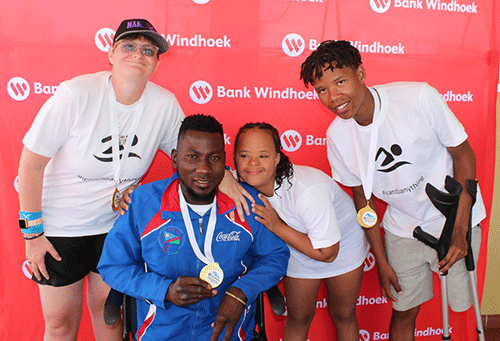Namibia stand an excellent chance to be well represented and even win medals at the Paris Paralympic Games in 2024, Namibia National Paralympic Committee (NNPC) treasurer Jean-Paul Schmidt said during the Bank Windhoek Long Course National Swimming Championships.
The event, which took place in Windhoek recently, welcomed four differently-abled swimmers who participated for the first time in the history of Namibian swimming. They are 29-year-old Mateus Angula, 26-year-old Caitlin Botha, 18 and 15-year-olds Jerome Rooi and Namasiku van der
Linden.
Para swimming is the sports term for swimmers with a physical, visual or intellectual impairment. The first step towards being a para swimmer is to join a swimming club. Once able to swim and race, the next step is for the swimmers to obtain an official para classification.
Under the hashtag #icandoanything, Angula, Botha, Rooi and Van der Linden finished all their races and broke some of their personal best (PB) times as they were cheered on by the other swimmers and supporters.
Angula broke his PB by 1.00 seconds for the 100 metre (m) freestyle and 2.48 seconds for the 50m backstroke. His new PB for these events is now 1:47.04 and 00:55.69.
Nicknamed Spiderman due to his super agility, Angula uses a wheelchair as he was born without legs, and has already represented Namibia at various regional and international para-swimming events.
Despite the cold water causing on muscle spasms, which makes swimming harder for Botha who has Cerebral Palsy (CP), she managed to knock off 1.01 seconds in the 100m breaststroke. Her PB for this event is now 4:00.20.
Rooi improved his PB for the 50m freestyle and the 50m backstroke knocking off 16.72 and 10.35 seconds, respectively. His PBs for these events now stand at 37.39 and 56.61 seconds. Rooi, who lost his left leg in 2017, only took up competitive swimming last year with great promise.
Van der Linden, who was born with Down Syndrome and experiences intellectual developmental delays and physical challenges, improved her times for six out of nine events, with the best improvement of 20.59 seconds in the 200m Individual Medley (IM), achieving a PB of 4:34.46 seconds.
All swimmers said they prepared well and enjoyed the Bank Windhoek Long Course National Swimming Championships, which they used as preparations for international competitions.
An important step towards participation in regional and international swimming events, including Paris 2024, is the classification of the newcomers Rooi and Van der Linden, and the reclassification of Botha.
Unfortunately, classifications are done outside of Africa and require substantial financial resources.


